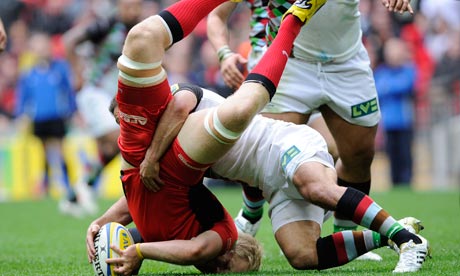
Types of injuries to rugby players and their prevention
Thursday, March 8, 2018
Rugby is one of the most popular sports in the world. Rugby requires a high level of endurance, agility, and speed, and also being a contact sport, comes with the potential for overuse injuries, head injuries, and traumatic injuries. You will find more detail about these types of injuries below, in addition to some tips for treatment and prevention if you get a sports injury, so that you can return to play.
Injuries caused by trauma/tackle
Due to the fact that rugby is a sport that involves a lot of collision, injuries caused by trauma occur regularly. The tackle has shown to account for 52% of rugby union injuries in recent studies in NSW. Traumatic injuries can be fractured bones, dislocated shoulders and fingers, cuts, sprains in the ligaments and tendons, as well as muscle bruises. If helmets and other facial protection are not worn, facial fractures and cuts to the face are more likely to occur in rugby. Injuries from contact forces such as knee injuries, as well as shoulder dislocation and sprains, are also likely to occur.
Head injuries: Concussion
Head injuries are a common injury that rugby players suffer, due to the amount of speed, contact and tackling that is done in rugby union. Symptoms of concussion include confusion, dizziness, headaches, lightheadedness and forgetfulness. Every rugby player that has a suspected concussion should be taken out of the game and properly taken care of, vetted and cleared by a sports medicine professional before the player is allowed to return to the game.
Overuse injuries
Overuse injuries such as knee tentidis or ankle tentidis, stress syndrome involved with the media tibia, and bursitis are very common in rugby players. Overextension and overuse injuries have been shown to account for 14.5% of injuries in rugby union in NSW. In the same study, we saw that over 50% of reported injuries did not result in lost games. Although these injuries are not as serious as head injuries and neck injuries, but without proper care and attention, they can affect the player's overall performance as well as complicate issues in the long run. Therefore, they should be checked out by a sports medicine professional such as a physiotherapist.
Treatment of injuries caused by rugby
To return to play the rugby player will have to work on strength, endurance, as well as flexibility. This is also important to avoid sustaining secondary injuries caused by the primary ones. Ensuring that the player has a high endurance level is a very effective way of checking if they are ready to return to the game.
Prevention of injuries caused by rugby
- Rugby injuries can be prevented in a number of ways.
- Have a strict and balanced training regimen that involves flexibility, strength as well as endurance.
- Endeavour to always make use of the right techniques when playing.
- Make sure you use the right positioning during the game to minimise risks.
- Make use of a good quality, fitted mouth guard.
- Do not endure more than the ability of your body.
- Make sure you follow the rules of the scrum formation.
There is also an excellent Rugby Union Fact Sheet written by the Department of Planning and Community Development and VicHealth, and published on the Sports Medicine Australia website.

